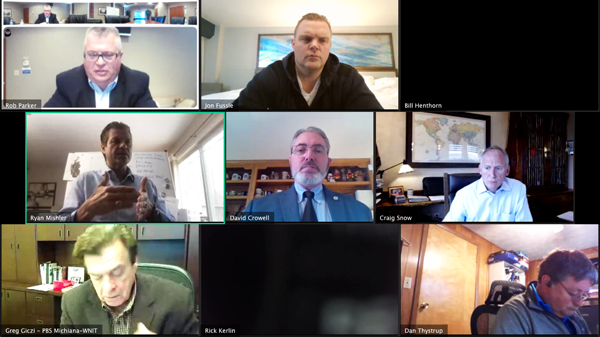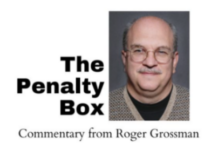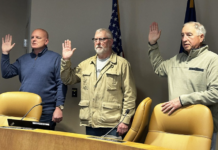
Indiana Sen. Ryan Mishler said Friday that this year’s legislative short session had the largest agenda he’s seen in the 18 years he has been a part of it.
“So it was very aggressive for a short session,” he said during the 3rd House Legislative Session hosted by the Kosciusko Chamber of Commerce. “The issue I always have is, we’re not supposed to open the budget in even-numbered years and that was what most of the legislation did.”
He said the state legislature needs to either do a budget every year or not have a short session any more.
“You can’t do both.”
But by the end of the short session on March 8, Mishler said he thought they put some good legislation out there. The most important piece of legislation he worked on the last several years, outside of the budget, he said, was Senate Bill 361.
“We created (Indiana Economic Development Corporation), we were ahead of the game. Other states have caught up, basically, used our same game plan against us. So, we felt that this year it was time to go to the next level so we got very aggressive and created these development districts, which is like the local TIF (Tax Increment Finance Districts). Now, the locals got fired up over it, felt like we were going to be taking their revenue, things like that, but I think at the end of the day a lot of them realized that maybe we’re taking some of that revenue from that little district, but the kind of companies that are going to move into those communities, into that district, they’re going to more than make up for what they would have lost in revenue from that development district,” Mishler said.
It was made retroactive.
“So, already, for the first quarter of this year, we’ve had more investment in Indiana than we had in all of last year after that bill because we made it retroactive to the first part of the year so they can go back with some of these companies,” Mishler said, mentioning deals going down in Boone and St. Joe counties. “We’re talking mega-billions on most of these investments.”
He thanked State Rep. Craig Snow, who also was part of Friday’s session, for helping him in the Indiana House with SB 361.
“I think we’re going to see dividends from that bill for many years to come,” Mishler said.
Another thing that Mishler worked on during the past legislative session was House Bill 1002, known to most people as the “tax cut bill.”
Mishler said he’s all about tax cuts as he’s got to pay them, too, but he wants to take care of the state’s liabilities first. Indiana has a “big” pension liability for teachers that costs the state over $1 billion a year out of the general fund that the state has been paying down for years.
“I wanted to really concentrate on paying that down before we gave tax breaks and all that,” he said. The House wanted to give out a bunch of tax breaks, and that concerned Mishler that they were giving that $1 billion a year away before the state even saved $1 billion a year.
“So we came to a good compromise, so we did a tax cut. In the seven-year phase-in, at the end of seven years, it’ll be tied to the lowest in the country – 2.9% – with North Dakota,” he said. That excludes the states that don’t have an income tax like Florida.
“But I think the key was the triggers. So, the income level has to grow by 2% to get that tax cut. And then I think the most important thing that I put in there was, if we don’t pay down that … liability by 2027, we can’t continue the reduction in the income tax. Because that’s how important I think it is for us to focus on our liabilities,” he said.
The problem with it is, he said, was that it’s not fun for legislators to go home and talk about paying down a liability. It’s more exciting for them to talk about what the state is giving money toward or to.
“So, the problem I have is, to get people on board, it’s not pretty to say we’re just paying down liabilities. But if we’re truly being fiscally responsible, we would pay our liabilities first. And I stuck by that,” Mishler stated.
U.S. 30
As part of his comments on the completed legislative short session, Snow brought up that U.S. 30 was a big topic.
“(State Rep.) Dave Heine and (Warsaw) Mayor Joe (Thallemer) came down and we got to meet with (Indiana Department of Transportation). Mike Smith, the new (INDOT) commissioner, was really helpful in working with us, hearing what” we were working on, Snow said.
He said Mishler pushed a bill, though he didn’t get it through, but it made a statement that INDOT needed to pay attention to the U.S. 30 Coalition and what they want to accomplish. Both sides came to an agreement to get started on it.
Snow said in a couple weeks he’ll go back to Indianapolis and meet with INDOT to start pushing the U.S. 30 corridor project.
“I’m concerned with how long it will take to get to Kosciusko County. It’ll start in Allen County, then go to Whitley. I’d like to see it run simultaneous, so we’ll see what happens, but that’s a big project that I’m trying to highlight for our county and get the infrastructure approved,” he said.
Later in the session, Mishler talked about the effort it’s taken to get needed improvements for U.S. 30 on INDOT’s radar and he credited the U.S. 30 Coalition for their work, especially Warsaw Mayor Joe Thallemer for taking the lead on it.
“I have to give that Northeast contingency a lot of credit. When they met with me and brought me on board … and I told the U.S. 31 folks this: They were way more organized. I said, ‘31, you all have been working on this a long time, but 30 – they are organized.’ And so I said, ‘We’re going to ride their coattails for 31,’” Mishler said, adding that from his perspective, U.S. 30 and 31 are the most important roads.
He said INDOT has started on the report card for U.S. 31 he asked for back in 2018-19, and he’s going to ask for one on U.S. 30 as well.
Abortion
During Wednesday’s District 22 candidate forum, the possibility of Roe v. Wade being overturned by the U.S. Supreme Court this summer was discussed, with Snow saying he wanted to see the end to abortion in Indiana.
Friday, Snow was asked, “If Indiana makes abortion illegal, that potentially may result in more unwanted children. What’s the state of Indiana’s foster care and adoption system and how can that be improved?”
Snow said that one of the bills he proposed this year, but it didn’t get a hearing, was working with a foster agency out of Kentucky that is the largest foster agency in that state.
“And the people that I worked with were wanting to come to Indiana. There’s a couple of things that they wanted to get done in order to do that, which my bill would have addressed,” he said. “What I was looking at was, how do we work with adoption agencies, foster care agencies because that would be an issue. And quite frankly, it is an issue and we’ve got to figure it out.”
He said there’s obviously a fiscal issue to that as it would require a lot of money, as well as a social issue.
“All of those things you can take into account, but, to be honest, I would much rather be dealing with that issue than dealing with abortion,” Snow stated. “So I would like to see abortion being overturned, making it illegal in Indiana.”




